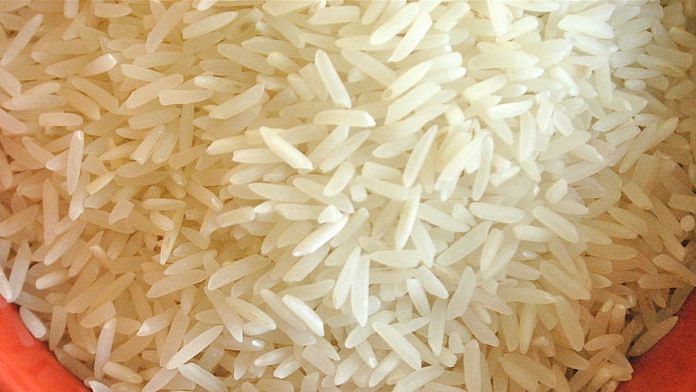New Delhi: The Government of India as well as agriculture experts have questioned the veracity of the European Union’s claim that the country supplied 500 tonnes of genetically modified (GM) rice to it.
They have pointed to the fact that India does not cultivate any GM rice variety, and the EU or its agencies should first provide evidence to verify their claim.
The controversy started in June 2021 when the European Commission’s Rapid Alert System for Food and Feed (RASFF) flagged 500 tonnes of rice converted to rice flour by France’s Westhove. The consignment of rice, claimed to have originated from India, was flagged for GM content. GM food is a matter of great debate within Europe, with various countries expressing opposition to it.
After the RASFF’s alert, France notified various countries which were possible destinations of products made with that particular rice flour. This also led to various food products being recalled by big companies across the globe, including candy giant Mars Wrigley carrying out a mass recall of several batches of M&M Crispy.
However, it took until 19 October for this to become an issue in India, when a civil society group ‘Coalition for GM-Free India’ wrote a letter to the Union ministries of environment, agriculture and commerce. The group claimed that though India is yet to approve commercial cultivation of a GM food crop, it has cultivated multiple GM rice varieties at various stages of confined field trials.
The group alleged that these trials have led to “contamination or leaks”, as in previous cases, and thus, GM crops have made it to the food chain. This, it claimed, could also result in future loss of reputation in high-worth agricultural export markets for India.
Also read: PM releases first non-GM herbicide-tolerant rice varieties. This is how they will help farmers
Commerce ministry’s response
The Union commerce ministry said in a statement that rice experts from the Genetic Engineering Appraisal Committee (GEAC), the Indian Agricultural Research Institute (IARI) and other bodies are investigating the matter.
The ministry said since there is no commercial variety of GM rice in India, so the possibility of GMO contamination due to white rice exported by the country was not possible, and proper testing was conducted before shipping the consignment.
It also pointed out that the EU itself is not sure of the exact source of the contaminant, and the consignment of rice passed through many hands before reaching the actual processor, hence there was the possibility of mixing or cross-contamination at every stage.
Commerce Ministry spokesperson D.J. Narain told ThePrint that “India is exporting strictly non-GMO rice to the world”, and that there is no possibility of GMO contamination due to white rice exported by India.
Narain also noted that the exporter, identified as wholesale trader Omprakash Shivprakash of Akola in Maharashtra, has also denied the allegations.
He added that there is hardly any possibility of cross-contamination during inland transit, as the final sample for testing was drawn at the port of loading by an independent inspection agency with international recognition, who, after due testing and verification, issued a non-GMO certificate before shipment.
Experts ‘suspicious’
A.K. Singh, director of the IARI, told ThePrint that he was suspicious about these allegations that the GM rice came from India.
“They need to provide at least three primary pieces of evidence. First, what is the transgene that has been detected; second, what is the selectable marker that has been used in developing that transgenic; and third, what is the promoter that has been used for expressing the gene? These are three essential components of any gene transfer used for developing transgenic plants, and these are well-characterised,” Singh said.
‘Selectable markers’ are unique qualities of a particular transgene or GM crop, like antibiotic/herbicide resistance or drought/waterlogging tolerance. Promoters are ‘drivers’ or enablers of these selectable markers or qualities.
Singh added that if this information is disclosed, it won’t be difficult to find out if the genetic modifications leaked out of laboratories, as claimed by the ‘Coalition for GM-Free India’.
“Once they disclose this information, we can find if we have ever worked on these transgenes in India, in any laboratory. Any work done in the country is well documented with various authorities like GEAC and RCGM (Review Committee on Genetic Manipulation). This information is available and can be verified.”
He also pointed out that in the area from where the rice was apparently sourced, “there has been no approval for contained open field trials” from where such a leak could’ve occurred.
Dr R.S. Paroda, former director general of the Indian Council of Agricultural Research (ICAR) and chairman of the Trust for Advancement of Agricultural Science, said there was no question of a GM consignment being sourced from India.
“India doesn’t commercially cultivate any kind of GM rice, so any question of a consignment of such size being contaminated doesn’t arise at all. All the exporting agencies like Agricultural and Processed Food Products Export Development Authority (APEDA) and exporters know about the international regulations, and strictly abide by it by multiple inspections,” Paroda said.
He also asked for evidence about the claims, and pointed out that the only GM rice commercially cultivated in the world is Golden Rice from the Philippines, which can be easily identified by its distinctive pink colour.
(Edited by Shreyas Sharma)
Also read: Overwhelming focus on wheat & rice aggravated India’s water crisis: Economist Mihir Shah



